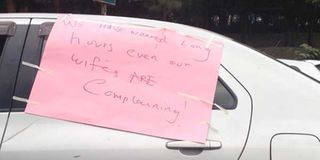Premium
We are being oppressed, taxi hailing apps drivers say

A placard by one of the drivers who use taxi hailing apps who protested in Nairobi on September 11, 2017 over what they termed is low pay. The drivers who use Uber, Little, Taxify and Mondo taxi hailing apps want an increase in the fares charged to customers. PHOTO | CARO ROLANDO | NATION MEDIA GROUP
What you need to know:
- Tens of drivers gathered outside City Hall in Nairobi on Monday.
- One of the drivers said they are suffering due to low rates.
- Joseph wants all companies to pay drivers at the same rate.
Drivers who work for taxi hailing apps Uber, Little, Taxify and Mondo began an indefinite strike on Monday, in protest of the rates at which they are currently being paid.
Tens of drivers gathered outside City Hall in Nairobi, hooting and making their plight known to passers-by.
"The problem with the companies is that they're not ready to listen to us,” said Daniel Omondi, the chairman of the Online Platform for Taxis Association.
“When we write an e-mail, they don't respond. We are tired of this. That's why we are on the street.”
Omondi told Nation that the Online Platform for Taxis Association had written a memo with demands to the companies, but that the statement could not be shared with the media or the public yet.
INCREASE CHARGES
However, he said they want an increase in the fare charged.
“Currently we are working for Sh60 (per kilometre). We can negotiate, but not for less than that,” he said.
Joseph, a driver who prefers to not have his last name used, said that drivers are suffering due to low rates.
“Because of the competition with other apps, they keep on reducing their prices. In the long run, it is us, the partners and drivers, who are losing. We are being oppressed,” he said.
SAME RATE
Joseph wants all companies to pay drivers at the same rate.
"Cutthroat prices and competition - we don't want it,” he added. “We just want every application to be uniform. It's for the client to choose which application he or she wants to use."
Uber currently charges a 25 percent commission on each ride, while apps like Taxify and Little Car charge 15 percent.
Traffic was slow on Monday afternoon as Daily Nation visited Uber’s office in Chiromo, where drivers intended to deliver a memo to Uber staff, before doing the same at Taxify and Little’s headquarters.
Drivers affiliated to the different apps stalled traffic as they displayed placards showing their displeasure.
One read: “We have worked long hours, even our wives are complaining!”
UBER OFFICE
However, inside the Uber office the atmosphere was strangely calm. Customers stood in line at information desks while soft music played in the waiting area.
Staff at the Uber office were unwilling to comment on the strike.
However, Uber spokesperson Janet Kemboi later sent a statement to Nation regarding the strike.
“We have established channels of communication and any driver-partner can speak to us at any time. There are many ways driver-partners can let us know if they have any individual concerns.
“We have GLH (green light hub) offices where drivers can come and speak to us about their individual concerns throughout the week. Uber succeeds when our partners succeed and our teams are working hard every day to find even more ways for drivers using the app to thrive,” she said in her email.
This is not the first time taxi-hailing app drivers have gone on strike.
In March 2017, Uber Kenya was forced to increase its fare by 20 percent after drivers went on strike over low profits.
FARE PER KM
In 2017, Uber had cut its fare to Sh35 per kilometre, after Little - backed by Safaricom Ltd - began offering lower prices.
But money has not been the only challenge for Uber employees. Many have faced hostility from other taxi drivers.
In March 2016, six men were charged with malicious damage to property and attempted murder following an attack on an Uber driver.
Commenting on the most recent strike, Uber driver Shelton Onchoka, said that he is prepared to stop working until his demands are met.
"Currently we are not able to make a living,” he said.
"We will continue (the strike) until they hear us."
Little, Taxify and Mondo did not respond to requests for a comment by Nation on the strike.




